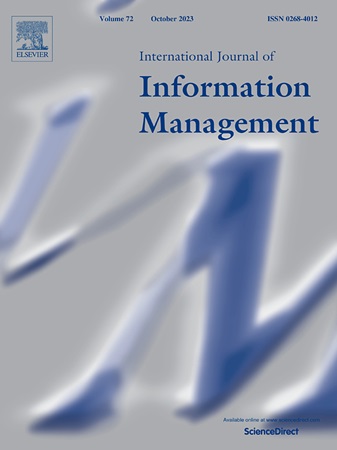Predicting strangers’ cooperativeness in Face-to-Face vs. Video-to-Video interactions: A case of inaccurate social prediction in mediated communication
IF 27
1区 管理学
Q1 INFORMATION SCIENCE & LIBRARY SCIENCE
International Journal of Information Management
Pub Date : 2025-05-31
DOI:10.1016/j.ijinfomgt.2025.102913
引用次数: 0
Abstract
In modern organizations, video conferencing platforms are frequently used for key interactions, such as job interviews and virtual team collaborations. However, the accuracy of social predictions during brief virtual encounters remains uncertain. This study investigates the impact of different communication media on the accuracy of predicting cooperative or generous behavior among strangers after brief interactions. Grounded in Media Naturalness Theory (MNT) and evolutionary psychology, we explore whether video-to-video (VtV) interactions affect the accuracy of predicting cooperativeness compared to face-to-face (FtF) interactions. Across two behavioral studies, participants engaged in FtF and VtV interactions, with the second study introducing a condition where eye contact was enabled using gaze correction technology (VtVg). Our findings consistently demonstrate that FtF interactions lead to significantly higher prediction accuracy than VtV, where accuracy levels did not surpass chance. Interestingly, enabling eye contact in VtVg did not significantly improve predictive accuracy. These results underscore the limitations of current video communication technologies in replicating the social cognitive and perceptual capabilities present in FtF interactions, with implications for remote interactions in organizational settings.
预测陌生人在面对面与视频对视频互动中的合作:中介沟通中不准确的社会预测案例
在现代组织中,视频会议平台经常用于关键交互,例如工作面试和虚拟团队协作。然而,在短暂的虚拟相遇中,社会预测的准确性仍然不确定。本研究探讨了不同的传播媒介对预测陌生人短暂互动后合作或慷慨行为准确性的影响。基于媒介自然性理论(MNT)和进化心理学,我们探讨了视频对视频(VtV)互动与面对面(FtF)互动相比,是否会影响预测合作性的准确性。在两项行为研究中,参与者参与了FtF和VtV的互动,第二项研究引入了一种使用凝视校正技术(VtVg)进行目光接触的情况。我们的研究结果一致表明,FtF相互作用导致的预测精度显著高于VtV,其中精度水平不超过机会。有趣的是,在VtVg中进行眼神交流并没有显著提高预测的准确性。这些结果强调了当前视频通信技术在复制FtF互动中存在的社会认知和感知能力方面的局限性,这对组织环境中的远程互动具有影响。
本文章由计算机程序翻译,如有差异,请以英文原文为准。
求助全文
约1分钟内获得全文
求助全文
来源期刊

International Journal of Information Management
INFORMATION SCIENCE & LIBRARY SCIENCE-
CiteScore
53.10
自引率
6.20%
发文量
111
审稿时长
24 days
期刊介绍:
The International Journal of Information Management (IJIM) is a distinguished, international, and peer-reviewed journal dedicated to providing its readers with top-notch analysis and discussions within the evolving field of information management. Key features of the journal include:
Comprehensive Coverage:
IJIM keeps readers informed with major papers, reports, and reviews.
Topical Relevance:
The journal remains current and relevant through Viewpoint articles and regular features like Research Notes, Case Studies, and a Reviews section, ensuring readers are updated on contemporary issues.
Focus on Quality:
IJIM prioritizes high-quality papers that address contemporary issues in information management.
 求助内容:
求助内容: 应助结果提醒方式:
应助结果提醒方式:


